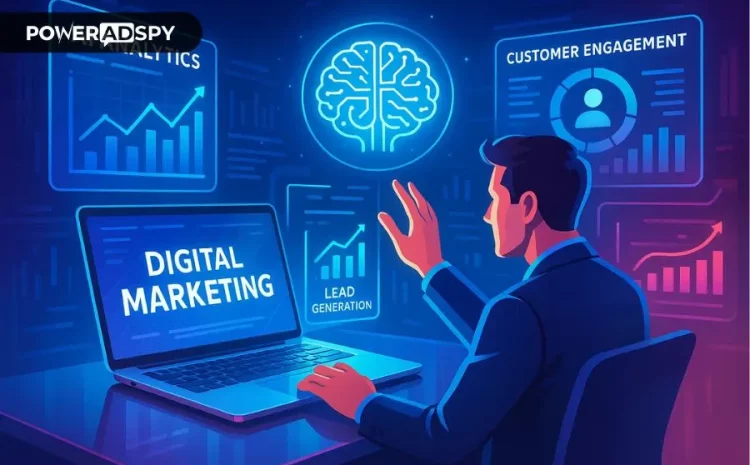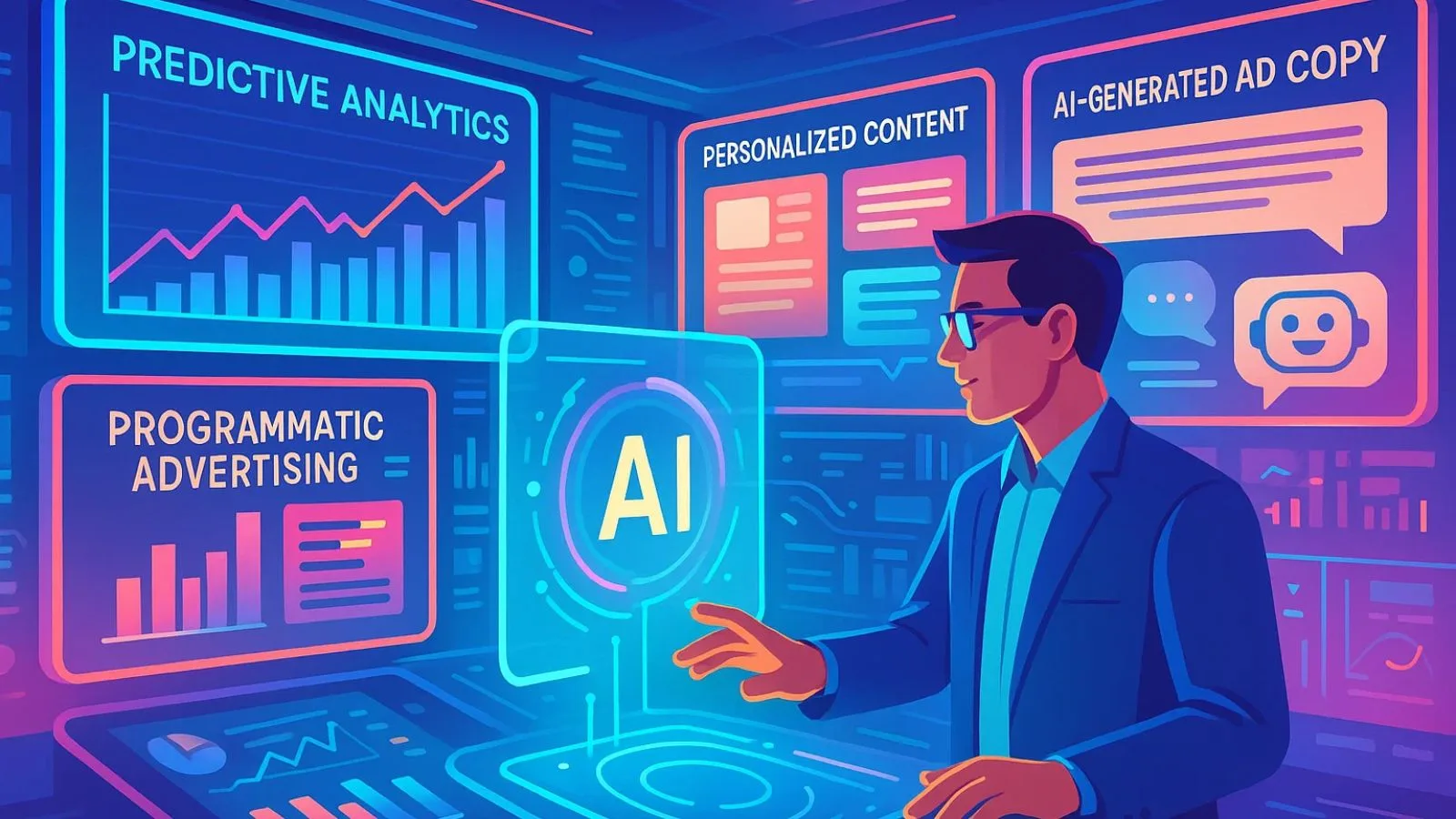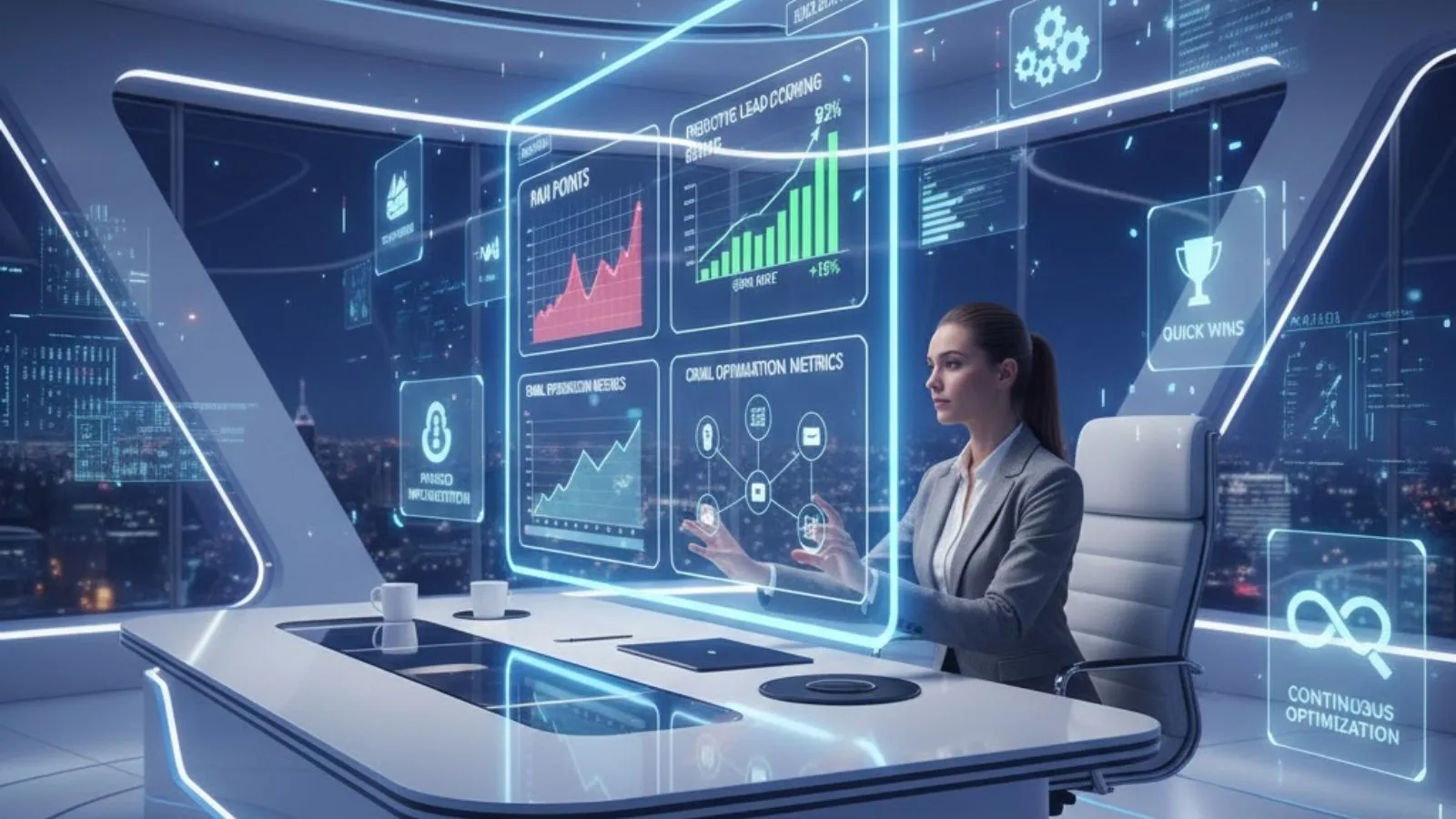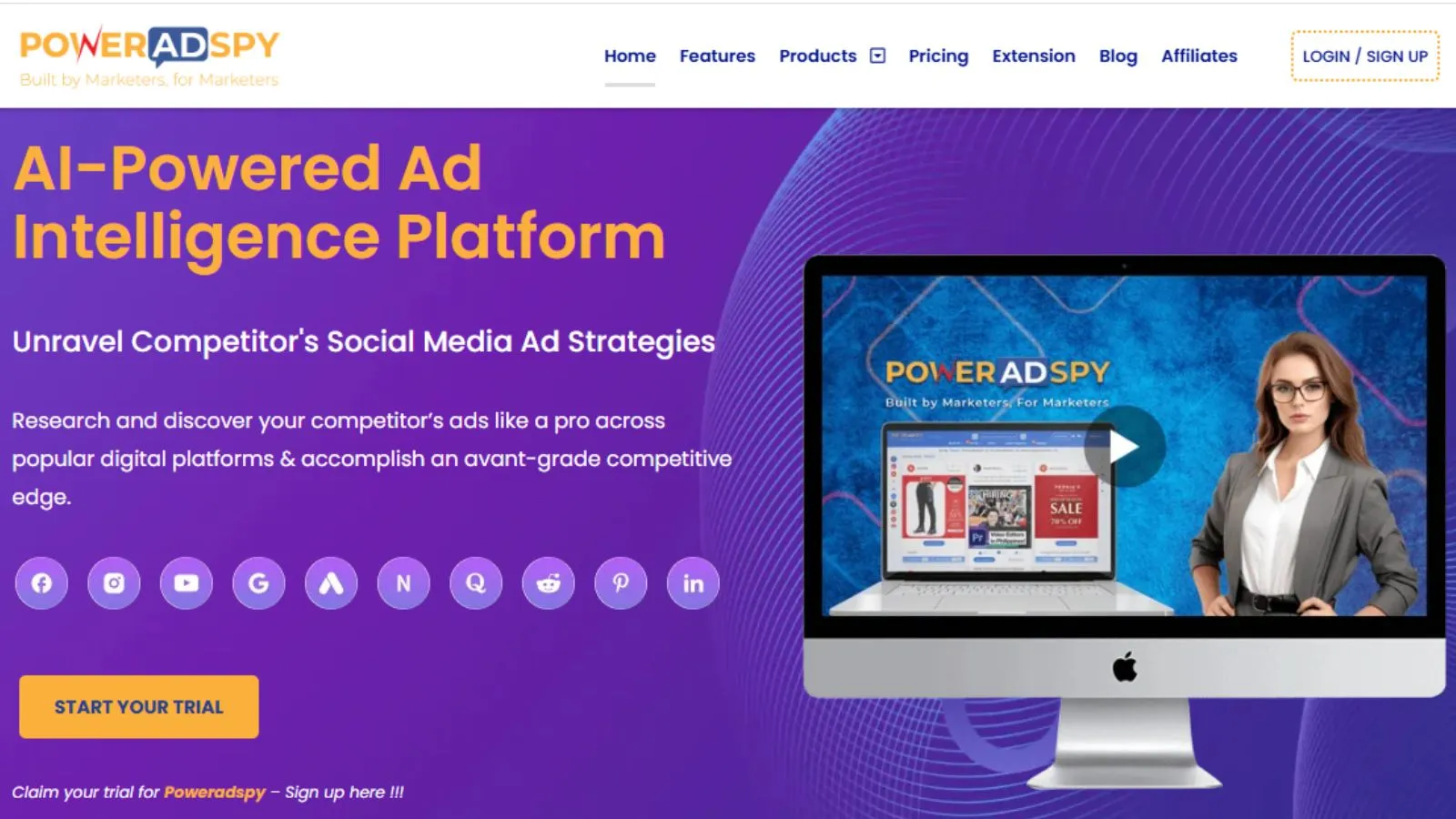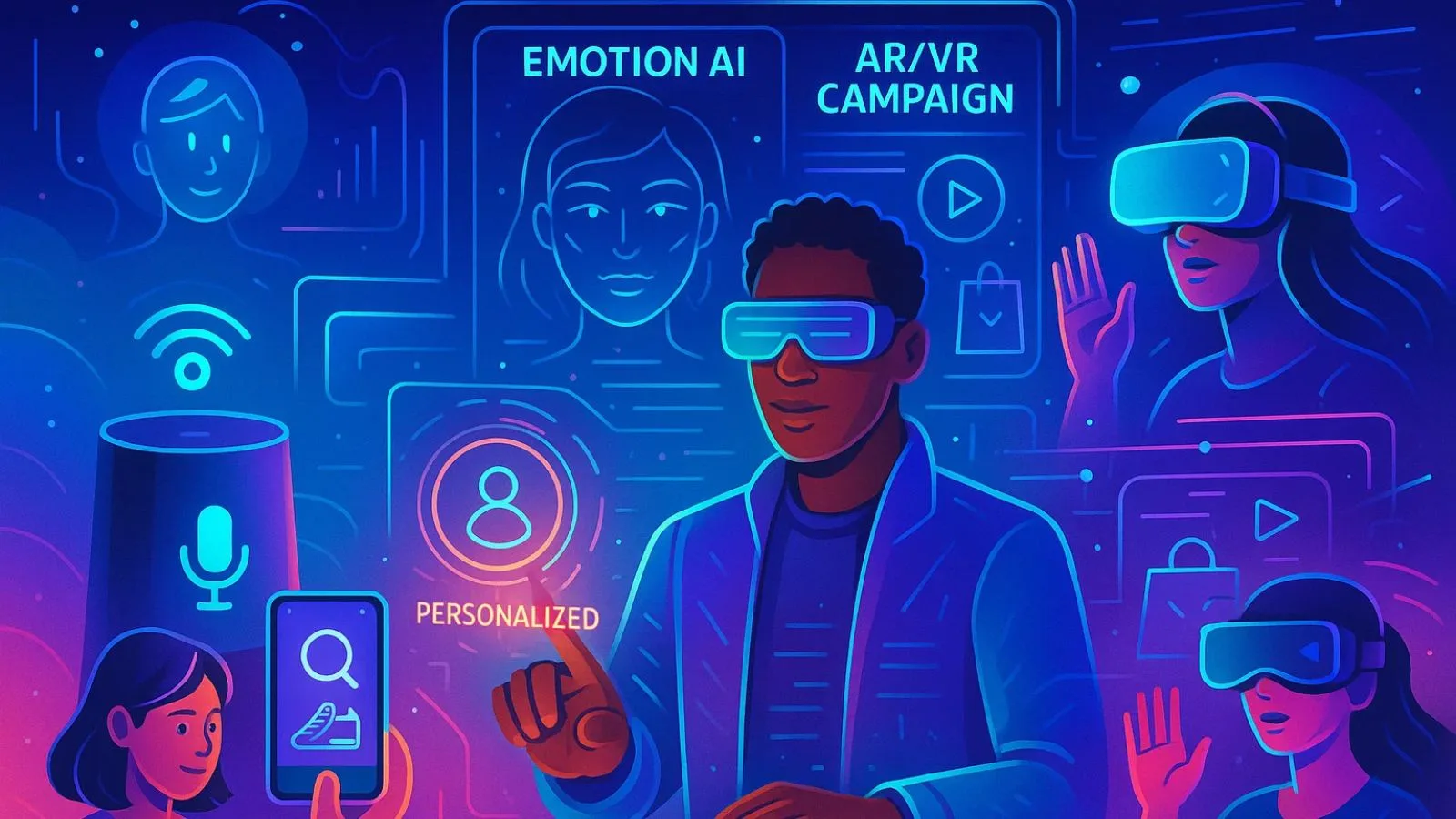The Ultimate AI In Digital Marketing Guide: Transform Your Business Today
The landscape of AI in digital marketing has shifted from a futuristic concept to a business necessity faster than anyone predicted.
What once seemed like science fiction is now the competitive advantage separating thriving businesses from those struggling to keep up.
Whether you’re a startup founder, marketing manager, or business owner, understanding how to harness this technology isn’t just smart, it’s essential for survival in 2025’s hypercompetitive market. The numbers tell a compelling story.
Companies implementing digital marketing strategies report up to 50% increases in lead generation, 40% reductions in customer acquisition costs, and unprecedented personalization capabilities that convert browsers into buyers.
But here’s what most guides won’t tell you: success with digital marketing isn’t about having the biggest budget or the most advanced tools.
It’s about understanding where AI fits into your specific business model and implementing it strategically. To Build Successful AI Marketing Campaigns, you need to focus on the core strategies that work, integrating AI tools that complement your goals.
This comprehensive guide cuts through the hype to show you exactly how AI in digital marketing works, which strategies deliver real ROI, and how to implement them without a PhD in data science.
Listen To The Podcast Now!
Understanding AI in Digital Marketing: What It Really Means:
Let’s get something straight: AI digital marketing isn’t about robots taking over your marketing department.
It’s about augmenting human creativity with machine intelligence that processes data faster and more accurately than any team could manually.
At its core, It uses machine learning algorithms, natural language processing, and predictive analytics to understand customer behavior, optimize campaigns in real-time, and deliver personalized experiences at scale.
Think of it as having a brilliant analyst working 24/7, constantly learning from every customer interaction and adjusting your strategies accordingly.
The real power of artificial intelligence in digital marketing lies in its ability to identify patterns humans miss.
While your team might notice that email campaigns perform better on Tuesdays, AI can tell you that Tuesday mornings at 9:47 AM specifically generate 23% more opens for your target demographic in the 35-44 age range who previously engaged with content about sustainability.
What makes It particularly revolutionary is its ability to operate across multiple channels simultaneously.
It doesn’t just optimize your email marketing or your social ads in isolation—it understands how these channels interact, how a customer’s journey flows between them, and where to invest your budget for maximum impact.
The Core Applications of AI in Digital Marketing:
1. Predictive Analytics and Customer Insights:
It excels at predicting future customer behavior based on historical data.
Modern AI systems analyze thousands of data points, browsing history, purchase patterns, social media interactions, email engagement, and more, to forecast which customers are most likely to convert, which products they’ll want next, and when they’re at risk of churning.
This predictive power transforms marketing from reactive to proactive.
Instead of waiting to see which campaigns work, and tells you before you launch which messages will resonate with which segments.
Marketing teams using these insights report 30-50% improvements in campaign performance.
2. Personalization at Scale:
Remember when personalization meant adding someone’s first name to an email? It has evolved that concept into something far more sophisticated.
Modern AI creates unique customer experiences for each individual based on their behavior, preferences, and predicted needs.
E-commerce brands using it for personalization see average order values increase by 20-30%.
When customers see products they actually want, recommended at the right time with messaging that speaks to their specific needs, they buy more.
Netflix and Amazon mastered this years ago, but now businesses of any size can implement similar strategies.
3. Content Creation and Optimization:
AI in digital advertising has revolutionized how brands create and distribute content.
AI tools can now generate ad copy variations, suggest optimal headlines, create social media posts, and even produce basic content drafts.
But the real value isn’t in replacing human creativity, it’s in amplifying it.
Smart marketers use it to test hundreds of content variations simultaneously, identifying what resonates before investing heavily in production.
This data-driven approach to creativity means higher engagement rates and better ROI on content investments.
4. Chatbots and Conversational Marketing:
Customer service expectations have changed dramatically. People want instant answers, 24/7 availability, and personalized interactions.
It delivers through intelligent chatbots that handle common questions, qualify leads, and route complex issues to human agents when needed.
The sophisticated chatbots powered by AI in digital marketing don’t just answer FAQs; they learn from every interaction, understand context and sentiment, and can even detect when a customer is frustrated and needs immediate human assistance.
Businesses implementing AI chatbots typically see 40% reductions in customer service costs while simultaneously improving satisfaction scores.
5. Programmatic Advertising:
AI marketing solutions have transformed how brands buy and place ads.
Programmatic advertising uses AI to purchase ad space in real-time, targeting specific audiences across millions of websites and apps.
The system automatically bids on ad inventory, optimizes placements, and adjusts campaigns based on performance, all in milliseconds.
The efficiency gains are remarkable. It for programmatic advertising reduces wasted ad spend by 30-40% by ensuring ads reach the right people at the right time.
Instead of broad demographic targeting, AI identifies individuals most likely to engage based on hundreds of behavioral signals.
Implementing AI in Your Digital Marketing Strategy:
Starting with AI in digital marketing doesn’t require a complete overhaul of your existing systems. The most successful implementations follow a strategic, phased approach.
Step 1: Identify Your Biggest Pain Points:
Where does your marketing struggle most? Are leads not converting? Is customer acquisition too expensive?
It works best when applied to specific challenges rather than implemented everywhere at once.
Step 2: Start with Quick Wins:
Begin with digital marketing and AI solutions that deliver immediate, measurable results.
Email marketing optimization, chatbot implementation, or predictive lead scoring typically show ROI within weeks rather than months.
Step 3: Integrate Across Channels –
Once you’ve proven success in one area, expand and integrate across your entire marketing stack.
The real power emerges when AI systems share data between channels, creating a unified view of each customer’s journey.
Step 4: Continuously Optimize:
AI-driven digital marketing isn’t a set-it-and-forget-it solution.
The most successful implementations involve regular review of AI recommendations, continuous testing of new approaches, and ongoing training of AI models with fresh data.
Also Read:
How PowerAdSpy Revolutionizes AI-Powered Competitive Intelligence?
While many tools focus on optimizing your own campaigns, PowerAdSpy takes a different approach; it uses AI to decode what’s working for your competitors, giving you a strategic advantage before you spend a dollar on advertising.
PowerAdSpy’s AI engine monitors millions of ads across Facebook, Instagram, YouTube, Google, and other platforms, analyzing what makes successful campaigns work.
The platform’s machine learning algorithms identify patterns in ad creative, copy, targeting, and engagement that human analysts would take months to discover.
Here’s where PowerAdSpy becomes invaluable for your marketing campaign:
The platform doesn’t just show you competitor ads, it tells you why they’re working.
Its AI analyzes engagement rates, ad longevity, audience reactions, and performance trends to surface insights you can immediately apply to your campaigns.
PowerAdSpy Key Features:
- Competitive Ad Intelligence – See exactly which ads your competitors are running, how long they’ve been active (indicating performance), and which creative elements drive engagement. The AI highlights successful patterns across your industry.
- Trend Prediction – PowerAdSpy’s AI identifies emerging trends in ad creative and messaging before they become mainstream, giving you a first-mover advantage in your market.
- Audience Insights – Understand which demographics engage most with competitor ads, revealing untapped audience segments for your campaigns.
- Creative Inspiration – The AI curates high-performing ad examples based on your industry, helping your creative team develop campaigns backed by data rather than hunches.
- Performance Benchmarking – Compare your ad performance against industry standards identified by PowerAdSpy’s AI, ensuring your marketing efforts remain competitive.
Marketing teams using PowerAdSpy report 40-60% reductions in the time needed to develop effective ad campaigns because they’re starting from proven templates rather than guessing.
The platform essentially gives you the collective intelligence of millions of dollars in competitor ad spend, processed through AI to deliver actionable insights.
The Future of AI in Digital Marketing:
The evolution of AI shows no signs of slowing. Voice search optimization powered by AI is becoming critical as smart speakers proliferate.
AI that understands natural language queries helps brands appear in voice search results, capturing a rapidly growing segment of customer interactions.
Visual search capabilities, where AI identifies products in images, are changing e-commerce.
Customers can now photograph items they like and instantly find where to buy them, bypassing traditional search entirely.
Emotion AI, which analyzes facial expressions and voice patterns to understand customer sentiment, enables unprecedented personalization.
AI systems can adjust messaging in real-time based on detected emotional states, creating more empathetic customer experiences.
The integration of AI in digital marketing with augmented and virtual reality opens entirely new channels for customer engagement.
Imagine AI-powered virtual shopping assistants that remember your preferences across visits, or AR experiences that adapt based on your individual interests.
Common Challenges and How to Overcome Them:
Despite its power, its implementation faces obstacles. Understanding these challenges helps you navigate them successfully.
1. Data Quality Issues:
AI is only as good as the data it learns from. Many businesses discover their customer data is fragmented, incomplete, or inaccurate. Solution:
Start with a data audit and cleanup before implementing AI systems.
2. Integration Complexity:
Connecting AI in digital marketing platforms with existing marketing technology stacks can be technically challenging. Solution:
Choose AI platforms designed to integrate easily with your current tools or work with implementation partners.
3. Skill Gaps:
Many marketing teams lack experience in interpreting AI outputs or knowing when to override AI recommendations.
Solution: Invest in training that helps marketers understand AI capabilities and limitations, treating AI as a tool that augments rather than replaces human judgment.
4. Budget Constraints:
Advanced AI in digital marketing platforms can be expensive. Solution:
Start with more affordable tools focused on specific use cases, demonstrating ROI before expanding to enterprise solutions.
Conclusion:
The transformation that AI in digital marketing brings isn’t coming; it’s here.
Companies embracing these technologies strategically are pulling ahead of competitors. Success doesn’t require unlimited budgets, just understanding where AI solves your specific challenges.
Start with one high-impact application of AI in digital marketing, addressing your biggest pain point.
Master it, measure results, and expand. The businesses thriving in 2025 combine AI capabilities with human creativity.
AI in digital marketing provides insights and efficiency; your team provides vision that connects with customers.
Ready to transform your marketing?
Start today with focused implementation and scale strategically.
Frequently Asked Questions:
Q1: Do I need technical expertise to implement AI in digital marketing?
Ans: Not necessarily. Many modern AI in digital marketing platforms are designed for marketers without coding skills. Start with user-friendly tools offering guided setup and strong support.
Q2: How much does AI in digital marketing cost?
Ans: Entry-level tools start around $50-200 monthly. Mid-tier platforms range from $500-5,000 monthly. Enterprise solutions exceed $10,000 monthly but serve large organizations.
Q3: Will AI replace human marketers?
Ans: No. AI in digital marketing augments human creativity rather than replacing it. AI handles data processing while humans focus on strategy and creative vision.
Q4: How long does it take to see results?
Ans: Simple applications show results within 2-4 weeks. Complex AI in digital marketing initiatives requires 2-3 months to optimize performance fully.
Q5: What’s the biggest mistake with AI in digital marketing?
Ans: Expecting magic without proper data and strategy. Success requires clean data, clear goals, and treating AI as part of broader strategic initiatives.

